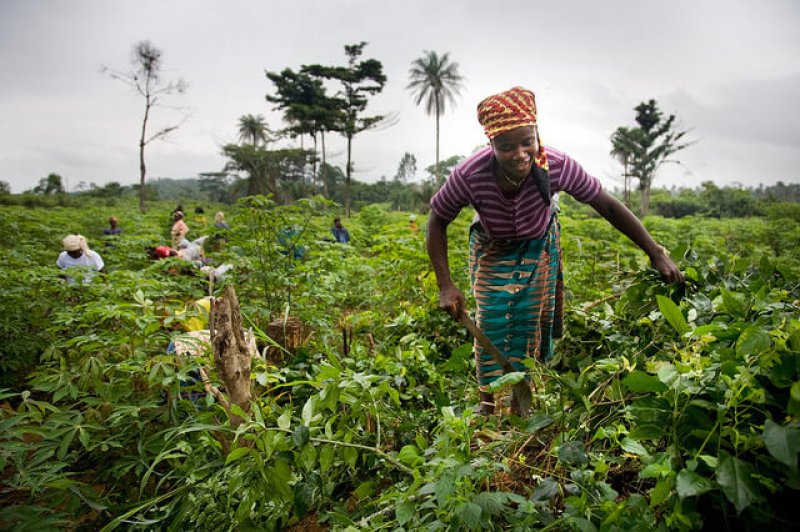The recent decision by the European parliament to oppose the promotion of large-scale, intensive farming and the use of GM seeds in Africa has stirred a swift and negative reaction among African scientists and food security experts. The measure was adopted by the European Parliament with 577 MEPs rejecting support for the New Alliance for Food Security and Nutrition (NAFSN) program, launched in 2012 to address global food security. NAFSN’s aim aim is to bring 50 million people out of poverty by 2050 by enabling investment in agricultural sectors in several African countries.
*******************
The call, in a report made by the Members of European Parliament (MEPs) to the New Alliance for Food Security and Nutrition, not to support genetically modified (GM) crops in Africa is unfortunate and an attempt to institutionalize poverty on the continent.
The G7 group of nations’ joint initiative with the New Alliance—aimed at lifting 500 million people out of poverty by 2022 using 10 African countries as pilot studies—to start using genetically modified tools in agricultural production is being thrown out of the window.
The report recommended that intensive agriculture that made Europe, the Americas, and many parts of Asia food secure should not be applied in Africa, but that the continent remain with small-scale farming practices that have not been able to meet our food and nutrition needs. Despite the huge tonnage of GM cereals and legumes imported into Europe used as feedstuff, their cultivation is prohibited—to ‘protect’ the environment, to maintain the organic market and, more importantly, for ideological reasons.
This was nicely described as ‘cultivation forbidden, importation indispensable‘ by Giovanni Tagliabue in a 2016 paper (The EU Legislation on “GMOs”: Between Nonsense and Protectionism, a paper for the 20th ICABR Conference) in which the author gave the example of the genetically modified Amflora potato which, due to long delays, was not commercialized only to be produced through mutagenesis and commercialized with no fuss as it was politically a “non-GMO”.
This saga between Europe and America makes Africa suffer. It has been established that agricultural biotechnology is needs-based in Africa. Reports from other developing countries that adopted the technology speaks volume on benefits; the risk aspects being properly managed by their regulators. The African end users, farmers and consumers need to be given the opportunity to access and assess the technology themselves.
The African political leadership is aware of the responsibilities of adopting the technologies properly. This is the reason most African countries and the EU Member States are parties to the Convention on Biological Diversity (CBD) which states in Article 16 that the transfer of technology, including biotechnologies, is essential to the attainment of the goals of the Convention. The CBD further urges Parties in Article 19 to promote priority access to the benefits arising from biotechnologies, especially for developing countries. Furthermore, 44 out of the 54 African Union Member States have signed and ratified the Cartagena Protocol on Biosafety.
This call for Africa not to grow GMOs will be in contravention of the Convention on Biological Diversity. In addition to this, the African Union Commission together with its technical arm, the New Partnership for Africa’s Development Planning and Coordinating Agency, developed a Biotechnology Strategy for Africa in 2007 and in 2008 established a unit to see to the safe and responsible application of the technologies called the African Biosafety Network of Expertise (ABNE). The mandate is to build functional regulatory systems in Member States that would like to adopt the technologies. It is also to build capacity for African regulators in all aspects of agricultural biotechnology regulatory work and thereby build confidence in decision making. Moreover, other biosafety service providers in Africa include the USAID Program for Biosafety System, the Biosafety Unit of the International Centre for Genetic Engineering and Biotechnology (ICGEB) and a number of biosafety civil society groups. This is intended to point out that regulatory systems are optimal especially in those Member States that have adopted or are in the process of adopting GM technologies in Africa. What we are striving to achieve in Africa is to embrace a science-based approach in the GMO policy decisions, with European Food Safety Authority as our excellent reference point although the MEPs have difficulties with some of its findings.
On trade, once Africa Member States are able to harmonize the regulatory frameworks properly within the regional economic communities (REC), intra-Africa trade is big enough to mop up GM products. Aside from this, the application of GM technologies focuses on African commodities that are of little or no significance in Europe except for Africans in diaspora and Europeans who have developed a taste for such commodities—as such, the level of trade for these purposes is minimal.
It is on these aforementioned opinions that the European Parliament should uphold its tenets of respect for human dignity, liberty, democracy, equality, the rule of law and respect for human rights by not opposing African Union’s efforts to make use of all available beneficial technologies. It is surprising to note that this call is only for Africa but not to other developing countries in Latin America and Asia. The African farmer must have the right to decide whether to plant improved seeds and must have access to safe new products that will benefit the family farm, local communities and also contribute to improved livelihoods and socio-economic development.
This article originally appeared on Biosciences for Farming in Africa as European Parliament Double Standard On GM Crops: The Saga Of Two Elephants Fighting and was reposted with permission of the author.
Diran Makinde was formerly the Director, New Partnership for Africa’s Development (NEPAD) Planning and Coordinating Agency, African Biosafety Network (ABNE) and now serves as Senior Advisor (ABNE). He was also the Director of the NEPAD West African Biosciences Network in Senegal. He earned a DVM in 1976, a PhD in Veterinary Physiology from the University of Ibadan in 1986 and a diploma in Neurophysiology from Edinburgh University in 1981.































